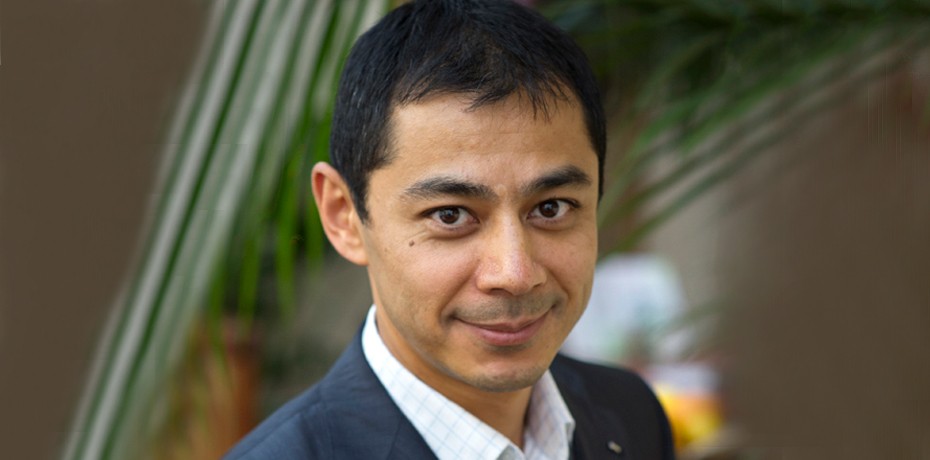Interview of Vice-President of ABBYY Company Aram Pakhchanyan to Mediamax Agency and Itel.am portal
Aram Pakhchanyan is the Vice-President of ABBYY Company, which has created such famous software as Lingvo and FineReader. Today, 128 Lingvo dictionaries in 10 language directions function in 138 countries of the world, and each second scanner in the world is equipped by FineReader text recognition program.
Aram Pakhchanyan was born on April 1, 1968, in Yerevan. He studied at school of physics and mathematics under YSU, and later graduated from Moscow Institute of Physics and Technologies (MIPT).
In 1993, he started working in ABBYY Company as a tech writer, then as the Deputy Head of Research and Development Department.
From 1997 to 2004, he headed the Department of Corporate Projects.
Since 1999, he has been occupying the position of ABBYY Vice-President.
Since summer, 2004, he has been heading Data Capture Products Department.
Aram Pakhchanyan is married, has two children and takes great interest in music and cookery. He likes traveling, downhill skiing, diving.
Aram Pakhchanyan agreed to talk to Mediamax about the prospects of IT in Armenia.
- Within the recent years, we have repeatedly heard talks about Armenia having the potential to become a new “Silicon Valley”. However, the matter usually does not go beyond talks. What can be done for IT sphere to develop more dynamically and effectively in Armenia?
- There are a few indicators of IT-market maturity level. When I arrive in this or that country, after an hour in the center of the capital city, I already can make certain conclusions as to IT-market maturity. Indicators are very simple. The first is the availability of at least one store, in which licensed software is sold, as well as availability of numerous stores, which sell non-licensed software, movies and music. The second indicator is availability of mature public IT companies. Most often one can see this from advertising banners in the city. If you took a walk in Moscow 5 years ago, you would not find a single IT company advertisement. Now the advertisements of “Yandex”, system integrators, providers of various services, are everywhere.
Armenia possesses communication from the sphere of IT, and this is mostly due to globalization. Communication is one of IT pillars, but it is not enough. I believe that Armenia should not compare itself to Russia, or even to Ukraine. The level of IT-market maturity in Armenia today can be compared to the situation in 1998-1999 in Russia, that is to say, ten years of lag. There is nothing horrible in this, since there is riot growth for Armenia ahead. On the other hand, for people, who are involved in the sphere of IT, for programmers in the first place, this is a very long term.
I often say that if we compare the profession of a programmer with the professions of a doctor or a lawyer, this will be like comparing beer to cognac. Beer gets spoilt quickly, and cognac becomes better each year – an old doctor or lawyer is more experienced and qualified. In programming everything is just the opposite: the best years in this profession are in youth. People, who start dealing with programming in Armenia today, to all appearances, don’t stand a chance within the nearest years to be involved in successful domestic world-class IT companies. At the same time, if we take the example of our ABBYY Company, we were founded and turned into a serious international player, supplying independent software products, in the period from 1993 to 2000. In this view, today Armenia has much work to do, since the country has a few good chances.
Chance number one: in Armenia, the labor force is inexpensive yet, and there is yet surplus in graduates of technical higher educational institutions, who would like to find a job in the given sphere. This is a very volume resource, which many people underestimate, since the financial and organizational issues seem to be of greater priority for business owners.
In countries, which lack significant experience in creating software products, (Russia can be considered a country of the kind), there is quite a serious problem of mental gap between businessmen and programmers. A businessman, who wants to do something in IT sphere, but does not very well understand its specific nature, thinks that it is very easy to create a program. And he focuses attention on marketing and on entering the market with the given program. However, he faces a strongly competitive market, which it is very difficult to enter. For the programmer, his task is to create a program, but he does not realize the direction, in which he should move further on. Moreover, he is attracted to maximally soft and simple products, and here, by the way, they are of similar opinion with the businessman. In reality, one can enter the market exclusively due to hard work, which will lead to creation of a product, which cannot be easily recreated by someone else. One can succeed only if one is unique. A simply nice idea is a very dangerous thing. Yes, one can realize it quicker than others, but conditionally, quicker for 20 minutes, for a year. But after those 20 minutes or 1 year pass, someone will create the same, and if that someone possesses more means for promotion, you have lost the game.
The understanding that one should find one’s way does not come to people easily. And here, the businessman, who will possess long-term strategic thinking, and the programmer, ready to trust that businessman and spend years of his life – 5, 6, 7 years, to realize the idea, should be of the same opinion. Instead, in 7 years, he will be able to enter the market with something that after those 7 years will be new for others, will be something unreal.
- Naturally, there are people in Armenia, who have good ideas and readiness to work over their realization, even if it will take the years you mentioned. However, what should the mechanism of revealing those people and providing them with the opportunity to work over practical realization of their ideas and their further commercialization be like?
- It is impossible to create such an environment outside the educational hearth. If we want to be leaders in a sphere, related to high technologies and knowledge, the issue faces the problem of quality education. If we take a look at the practice of many countries, for instance Israel, the model is the same practically everywhere: a certain university institution, or a group of universities, should become centers for crystallization and collection of creative work of young people. Here we talk about a definite form of real live incubator, in which at the first glance reckless ideas will be born, which may interest and attract venture capitalists. At that, the government should initiate establishment of a venture fund and take definite financial participation in it.
However, there is another fundamental problem as well. Without solving this problem one cannot hope for great results. This is the problem of domestic demand. Basing on objective reasons, it is very difficult to create projects, which will be meant purely for the international market. This is why the state should think about stimulating domestic demand and should take up steps to reduce the mass piracy, which exists in Armenia today. It is difficult to achieve something without a domestic software market. Young IT companies in the very beginning of their path should focus on domestic demand, which Armenia lacks today in practice. In all counties with developed IT sphere there is a domestic market.
- Let’s suppose, they managed to generate successful ideas and to attract the attention of foreign funds. Naturally, they will be interested in terms for realizing investments and running business in Armenia. Let’s take your company as an example. Let’s suppose, you have an intention to open an office abroad, and you consider two variants - Armenia and some other country. Which one will you choose?
- The main competitive advantage, which we consider in the first place, is the level of technical education. Here we mean that students should come out of their higher educational institutions with well-trained brains, should be able and should have the desire to solve tasks. To certain extent, Armenia has it. But, unfortunately, one cannot talk about Armenia’s ability to seriously compete in the given sphere. It is practically unreal to compare the level of higher education in Armenia with the one in Moscow, or in Saint Petersburg. Maybe, the level of technical education in Armenia is better than in Krasnoyarsk or in Saratov, which are the centers of outsourcing in Russia and where the offices of most major international IT companies are located.
However, the point is not only education. The point is the entire complex of issues, related to running business. And in this context, there are system gaps in Armenia: people will be late for almost all negotiations; at a hotel you can face many everyday problems, etc. Such problems become a sign for the investor, indicating the level of management culture in the country, and tell him that it will be extremely difficult to manage their Armenian subdivision.
When ABBYY was assessing the prospect of setting up an outsourcing platform, we realized that Yerevan yields to other possible regions.
- What does “Ayb” Educational Foundation, one of the initiators of which you are, want to achieve?
- Our goal is to take the situation out of the standstill, introduce a fresh breath of the global educational practice in Armenia. We want the entire educational system of Armenia to reach a far higher level in the final end.
Another important task is to infect with our ideas as many people as possible, since we are extremely insufficient to solve the large-scale tasks, which we want to realize. The level of education in the country can be increased if there is mass effort.
We believe that the Armenia’s future is a society of highly educated people, which should become an example for spiritual development for the entire world, like it was in 301, when Armenia was the first to adopt Christianity.

17:29 | 24.09.25 | Articles
Jacopo Losso on Cross-Border Investments and Why Armenia Attracts Angels









